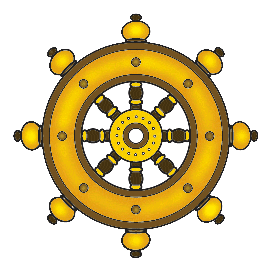14. The Free Life Pond
14. The Free Life Pond
The peaks of T’iant’ai Mountain in Chekiang are green and black. They stand like an ornamental screen. People come from far away to enjoy the scenery here.
For thousands of years, there have been many temples in these beautiful mountains. The head of a big temple there was called Chihyi . He lived from about 539 to 597 AD. Because he was so wise, the Emperor Yang of the Sui dynasty gave him the title The Wise Master, and this is how he is known even today.
At the time, The Wise Master felt that people were too cruel, especially when they wanted something to eat. They would kill almost anything that moved and eat it.
He decided something had to be done. But how? Monks don’t have any money. So The Wise Master became a beggar for several years until he finally got enough money to get some land and hire some workers to build him a pond.
When people saw that, they laughed and said The Wise Master is pretty dumb!
Because he was so wise, The Wise Master didn’t care how much they laughed at him. He kept up work on his pond.
When the workers had spare time, he told them about Buddhism. He said, “The sutras (the holy books of Buddhism) say, ‘All living creatures have Buddha nature.’ You may not think much of a fish or a crab, but they too can become Buddhas.
“Wild animals all have Buddha natures, too. If somebody gets killed by a wild animal, we think it’s tragic. We feel sorry for that person. Hasn’t it ever occurred to you that when you kill a fish, the other fish think it’s tragic, and feel sorry for the dead fish?”
The Wise Master explained that he was making a pond so anybody who had a fish or crab could have a place to release it and let it live out its life in peace. He called his pond the Free Life Pond.
The workmen were moved, and the people who had laughed at him felt sorry for being so mean. They became Buddhists, and stopped killing animals to eat their meat.
Other temples copied his idea. If you have a chance to visit a Chinese Buddhist temple, you can probably see their Free Life Pond, full of happy fish and crabs and turtles that are safe from the worry of being cooked and eaten.
